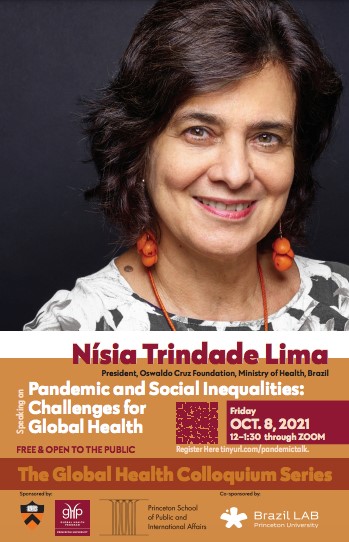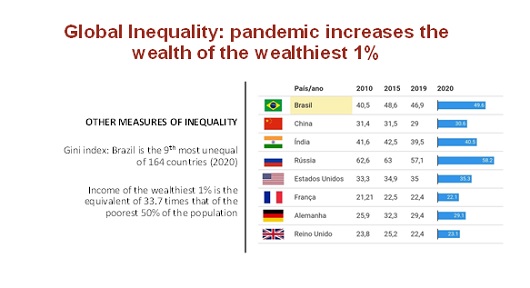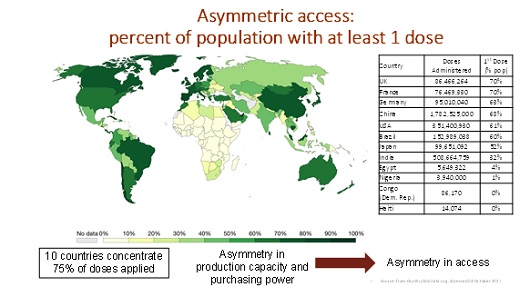Fiocruz president debates pandemic and social inequalities in Princeton
16/10/2021
Ciro Oiticica (Fiocruz News Agency)
 Sociologist and Fiocruz president, Nísia Trindade Lima, presented last Friday (October 8th) the conference Pandemic and Social Inequalities: Challenges for Global Health. The event was part of the Global Health Colloquium Series, a biannual series of lectures by Princeton University's Program in Global Health. Nísia thanked the university and Brazil Lab for the invitation, a hub that connects researchers and professors interested in public management in the country. The mediation was by Arbela Griner, postdoctoral fellow of the Program and event organizer.
Sociologist and Fiocruz president, Nísia Trindade Lima, presented last Friday (October 8th) the conference Pandemic and Social Inequalities: Challenges for Global Health. The event was part of the Global Health Colloquium Series, a biannual series of lectures by Princeton University's Program in Global Health. Nísia thanked the university and Brazil Lab for the invitation, a hub that connects researchers and professors interested in public management in the country. The mediation was by Arbela Griner, postdoctoral fellow of the Program and event organizer.
Values, total social fact, and interdependence
The sociologist warned about the lack of neutrality in her presentation, as she defined four elements as guiding values: the science defense, health, citizenship, and democracy. One of the central themes was the production and access to vaccines in the current COVID-19 pandemic context. A parallel has been drawn between vaccines and drinking water to defend the status of these two basic goods as public goods. "Given the epidemics recurrence in this 21st century", she said, "it is possible to think that these scenarios will be more frequent and that vaccines will indeed be an essential commodity for the collective."
Two central concepts of social theory ran through the entire presentation. The "total social fact" idea, plus the global aspect, was taken from the thought of the anthropologist Marcel Mauss, and the social scientists Frédéric Vandenberghe and Jean-François Véran, to refer to epidemics, because they affect all dimensions of social life, without being possible to separate them. "The Gamma variant experience in Amazonas" exemplified, "with its transmission conditions, given the agglomeration caused by river transportation, makes explicit the intimate relationship between social situations and epidemics." The interdependence concept, developed in Norbert Elias sociology in turn, would highlight the relational perspective in society, how events influence each other. This concept unfolding proposed in a text by Tatiana Landini would have pointed, for example, to the centrality of the Great Plague in the 14th century for the establishment of the first public health agencies, showing how pandemics and public policy interact.
Inequalities at the national and international levels
On this basis, the public policies articulation at the global level was analyzed. Important references for them, the Sustainable Development Goals (SDGs) of the United Nations (UN) and its Agenda 2030, despite some skepticism, were valued by the Fiocruz president as an important global pact, which allows the convergence of expectations and actions in pursuit of achieving these goals. Considering also the Human Development Report 2019, the development idea went beyond mere income expansion. In life expectancy terms, for example, the report revealed that between 2005 and 2015, in low-income countries, there was a considerable increase in life expectancy for newborns.
However, the inequality is still large for the expectation of those who have already reached 70, being only 5 years longer in low-income countries, compared to 12 years in high-income countries. Another fact concerns school life. While a significant increase in the population that has completed primary education was observed between 2007 and 2017, inequality is still huge for the portion that has completed university education. The pandemic would have not only accentuated these persistent inequalities, but created new ones. The recently published Reports on Social Development, by Jeffrey Sachs, president of the UN Sustainable Development Solutions Network, also revealed that for the first time since 2015, there was a regression in the SDGs in 2020. The pandemic, besides being a global health emergency, would also have caused a sustainable development crisis.
Other impressive data were presented, taken from the article Asymmetries and Challenges for the Future of Health, which the researcher wrote together with Carlos Gadelha, the Center for Strategic Studies coordinator (CEE/Fiocruz). Nísia warned that the pandemic has intensified the income concentration among the 1% in the world, especially in Brazil. The country leads the income concentration ranking, with the top of the pyramid continuously enriching between 2010 and 2019, and ranks 9th among the most unequal countries in the world in 2020, out of a total of 164 countries, according to the Gini index. The richest 1% concentrates the equivalent of 33.7 times the income of the poorest 50%, while 30% of Brazilians are in poverty and 10% in extreme poverty. In the world, in turn, the pandemic increased both the number of millionaires and their income. They had 35% of the world's wealth in 2000 and now have 46%.
Vaccines Importance and Multilateralism
The vaccine's importance would fall within this global asymmetries context and launch the challenge of a global vaccination strategy. Nísia says there will be a huge inequity in overcoming the pandemic and recovering worldwide. "But the effects will be for everyone because it is a total social and global fact. International cooperation and multilateralism will, she says, play a central role in promoting some equity in this scenario.
It is in this sense that the vaccine would need to be seen as a universal public good. "As Jonas Salk, the inventor of the polio vaccine in 1955 who refused to patent it, suggested", Nísia illustrated, "patenting the vaccine would be equivalent to patenting the sun, a good so important that it needs to be accessible to all society. However, other interests would have prevailed in 2020, related to a health's economy and a knowledge geopolitics exercise.
In relation to access to the vaccine first dose, there would also be a brutal asymmetry. Some countries have not even reached 10% of the vaccinated population with the first dose, as is the case in almost all African countries. There are also vaccination difficulties in Latin America, especially when considering immunization with two doses.
The pandemic thus reinforced barriers to the SDGs and exacerbated existing risks, structural inequalities and systemic challenges, according to Nísia. It has overburdened social security systems that were already being underfunded, as is the SUS case (the Brazilian public health system), in addition to several other impacts on employment, migration, humanitarian aid, education, and global production chains. Multilateralism would then face these challenges.
Fiocruz's Performance
Fiocruz's response to the pandemic was then presented to an audience of Princeton students, researchers, and professors in public health management. "We mobilized the efforts of all units, from biomedical to social sciences. We produce diagnostics, kits and analyses, research, clinical trials for drugs and vaccines, genomics network, communication, education, training of health professionals, support for vulnerable populations, specialized care for critically ill patients, and vaccine production," Nísia enumerated.
She also said that the Fiocruz COVID-19 Observatory was created, to support the Foundation policies with a specialized follow-up of the pandemic. Vaccination campaigns were promoted, to evaluate the mass immunization effects, as in Paquetá (an island in Rio de Janeiro), Botucatu (São Paulo), and Complexo da Maré (Rio de Janeiro). "In this last case", Lima said, "we had a very successful experience in cooperation with civil society and local social movements, which allowed us to verify a significant cases reduction after the first dose."
The production of vaccines by Fiocruz, in an agreement with AstraZeneca, which included technology transfer, was also highlighted. More than 100 million doses were delivered, and the national API production, still in pre-validation, is underway. The Fiocruz choice by the WTO, together with a laboratory from Argentina, to be a production center of mRNA vaccines for Latin America and the Caribbean was celebrated by Nísia.
Dialogue with the audience
A series of questions then began to enrich the debate, in interaction with the audience. Among other topics, the regional specificities in facing the pandemic, the intellectual property issue, the vaccination difficulties in Brazil compared to those faced in other countries, the racial clipping of the pandemic incidence, and the challenges faced by women in the institutional performance were discussed.
Unlike some experiences in other countries, the difficulties in Brazil were not due to a refusal to vaccinate, according to her, "because we have a greater than 80% vaccines acceptance. Our difficulty has been more in convincing people to show up for the second dose".
In Brazil, it was also verified, according to her, an alarming racial clipping in the incidence of infections and deaths, as the highest number of them occurred among the black and brown-skinned population. Regarding gender inequalities, the first woman to chair the Foundation highlighted the fact that, although most professionals at Fiocruz are women, this proportion drops significantly when considering the Advisory Boards. "I reinforce the public policies' importance to overcome these inequalities, such as the Pro-Gender and Race Equity Committee at Fiocruz."
The sociologist reinforced that it is impossible to discuss the pandemic only from the standpoint of its immediate effects. She warned about its lasting and persistent impacts, which will constitute, according to her, challenges in seven areas: environmental, demographic, related to inequalities, biotechnological, computer/communication, related to changes in the world of work, and democratic. These impacts are related to broader social conditioning factors”, she noted, "which demand a response at the multilateral level in international relations and which also involve the direct relationship in a health institutions network. She advocated multi-level international cooperation, more virtuous and that reinforces the values of science, health, citizenship and democracy. "Thinking about Brazil, but also on a planetary scale", she added, "on a planet for which we all have hoped."


